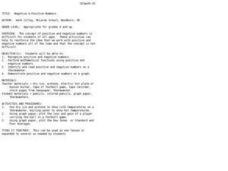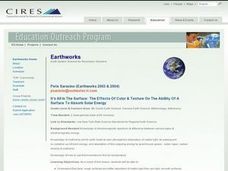Curated OER
What Is the Freezing Point?
Students remove heat energy and determine how it causes a phase change.
Curated OER
Weather Watchers
Students practice using objective and quantitative means to describe and compare the weather. They compile weather conditions and create a spreadsheet to record their findings.
Curated OER
Farming and the Services of a Community (Lesson 5)
Students identify different types of farms and services of a community. They use a pretend farm scenerio and a worksheet to distinguish between the different types of farms. They also practice using new vocabulary.
Curated OER
Watching the Weather
Students examine the weather. They discover the conflict between man and nature caused by the changes in weather and the impact it has upon their lives. Students explore weather folklore. They write a report on the weather. ...
Curated OER
Biological Succession in a Microecosystem
Learners investigate the concept of biological succession by simulating the process in a microenvironment with various microorganisms. By engaging in a lab, students determine the factors causing succession and learn population sampling...
Curated OER
Food For Keeps
Students investigate the concept of food preservation. They use the internet to conduct research, specifically the methods of processing the students' favorite foods. They are introduced to the project using realia like beef jerky and...
Curated OER
Teaching about Fish Stocking Decisions
Tenth graders complete a directed study, form the internet, and then complete activities.
Curated OER
What is a Cloud?
Third graders identify a cloud and explore how they form. They create an acrostic poem about clouds.
Curated OER
Energy Content Of Foods And Fuels
Learners engage in a study of food and how it used as fuel for the human body. They research how biological systems require energy and compare them to the physical science systems like machines. They compare and contrast what they have...
Curated OER
Negative & Positive Numbers
Students recognize positive and negative numbers and perform mathematical functions.
Curated OER
It's All In The Surface: The Effects Of Color & Texture On The Ability Of A Surface To Absorb Solar Energy
Ninth graders examine how dark surfaces absorb more light than light surfaces. They perform an experiment that compares various surfaces abilities to absorb heat, then record and analyze the results.
Curated OER
Relative Humidity of Your School
Pupils predict the location where the relative humidity the highest and lowest in and around their school. They use a sling psychrometer to measure the relative humidity of the various locations.
Curated OER
Teaching about Conductivity
Young scholars explore conductivity and productivity in aquatic systems.
Curated OER
Weather Around the World
Young scholars learn a few key weather terminology and a variety of climates through examining and recording weather characteristics in a variety of communities around the world.
Curated OER
A World Of Matter
First graders complete a variety of experiments with solids, liquids and gases. They read books about matter, identify the characteristics of solids, liquids and gases and the sort and classify a variety of matter. Students make...
Curated OER
Scientific Investigation- Magnets
Students conduct a scientific investigation to determine if a magnet attracts paper clips through different materials. Students write out their procedures, collect data and present it in a table or chart, and analyze their results.


















